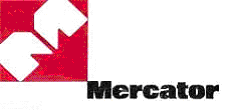Computer programming verbonden aan alle aspecten van het leven
Gerecht EU 29 maart 2012, zaak T-417/09 (Poslovni Sistem Mercator tegen OHMI/Mercator Multihull)
 Gemeenschapsmerkenrecht. In de oppositieprocedure komt aanvrager van het woordmerk MERCATOR STUDIOS houdster van de Sloveense en internationale beeldmerken MERCATOR en MERCATOR SLOVENSKA KOŠARICA tegen. De oppositieafdeling wijst de oppositie af, het beroep wordt verworpen. Het aangevoerde middel: De Kamer van beroep heeft de relevante factoren niet globaal beoordeeld, en de diensten zijn niet verschillend.
Gemeenschapsmerkenrecht. In de oppositieprocedure komt aanvrager van het woordmerk MERCATOR STUDIOS houdster van de Sloveense en internationale beeldmerken MERCATOR en MERCATOR SLOVENSKA KOŠARICA tegen. De oppositieafdeling wijst de oppositie af, het beroep wordt verworpen. Het aangevoerde middel: De Kamer van beroep heeft de relevante factoren niet globaal beoordeeld, en de diensten zijn niet verschillend.
Het Gerecht EU geeft aan dat "computer programming" verbonden is aan alle aspecten van het leven en het bedrijfsleven. Omdat er geen identieke of soortgelijke diensten zijn, is er juist vastgesteld dat er geen verwarringsgevaar bestond tussen de merken: "it is very common, as the Board of Appeal rightly observes, for numerous services to involve the use of computers which must be programmed." De klacht wordt alsnog afgewezen.
24 The Board of Appeal held that the service of ‘computer programming’ was different from the services covered by the mark applied for. According to the Board of Appeal, the service of ‘computer programming’ ‘is the process of … writing, testing, debugging/troubleshooting, and maintaining the source code of computer programs’, whereas the services covered by the mark applied for did not involve the process of writing computer programs but dealt with the technical development of vehicles in the field of transportation. The Board of Appeal added that the mere fact that computers used to offer the services covered by the mark applied for needed to be programmed did not render the services in question similar, given that nearly all services involved the use of computers which needed to be programmed.
31 It is true, as the Opposition Division itself acknowledges without being contradicted by the Board of Appeal, that computer programming may be used as a tool for the purposes of research, design and development of means of transport. However, that fact is not in itself sufficient to conclude that the services in question are similar. Since computer programming relates to all areas of life and business activity, as has already been mentioned in paragraph 28 above, it is very common, as the Board of Appeal rightly observes, for numerous services to involve the use of computers which must be programmed.
32 Accordingly, since one of the essential conditions for applying Article 8(1)(b) of Regulation No 207/2009, namely the identity or similarity of the services in question, has not been met, the Board of Appeal was right to conclude that there was no likelihood of confusion between the marks at issue.
Unfair advantage?
44 In the present case, the applicant submits, in essence, that there is sufficient evidence to conclude that the mark applied for will enable its proprietor to take unfair advantage of the distinctive character or the repute of the earlier marks, since there will be clear freeloading and exploitation of the famous mark Mercator. According to the applicant, it is clear from all the evidence filed that Mercator is a household name in Slovenia and that everyone associates it with the famous Mercator consumer goods retail stores. In addition, there is no doubt that, due to the large advertising and charity campaigns, together with the appearance of Mercator in the Slovenian media, everyone in Slovenia will mistakenly believe that the mark MERCATOR STUDIOS is linked with the owner of the famous Mercator retail stores.45 It should be borne in mind that, although the proprietor of the earlier trade mark is not required to demonstrate actual and present injury to its mark for the purposes of Article 8(5) of Regulation No 207/2009, he must, however, prove that there is a serious risk that such an injury will occur in the future (see, by analogy, Case C‑252/07 Intel Corporation [2008] ECR I‑8823, paragraph 38).





















































































